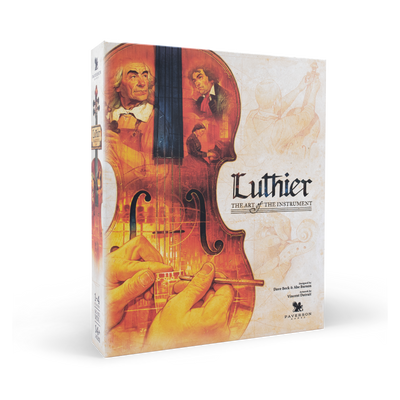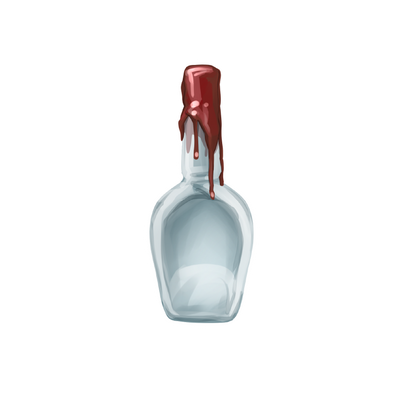
As we were continuing to design and develop Luthier, Richard Woods (both Distilled and Luthier’s developer) knew he had to create something to test the main game’s development more frequently than waiting for the next multiplayer playtest. So, Richard smartly created a solo mode that would allow him to test all of the constant tweaks we were making.
This is when it hit me - I wanted to ask David Digby back for help, but also knew Richard had been creating something interesting that I wanted to pursue further. So it wasn’t time for a just one person to create a solo mode.
This music-themed board game’s solo mode called for a duet (see? there I go again!).

Richard: As the developer for Distilled, I had an absolute blast play testing Distilled solo a couple of years ago, providing Davd Digby, the solo designer, with hundreds of data points and helping him to refine the solo cards and rules. It was a great way to develop the overall game too, and I would test out all the different identities and other cards many times over to help balance everything. When I started to develop Luthier I was therefore very keen to find a way to play it solo as well, despite having never designed a solo mode before.
There is a lot more direct interaction between players in Luthier than there is in Distilled, so I knew from the start that I’d need to create an automated opponent, or an AI or “bot”, that players could pit their wits against. One of the aspects of Luthier that I love is how as a player you are constantly building your engine and getting more and more powerful as the game progresses. This was therefore something I wanted to ensure the AI would do too. So I came up with a set of action cards for the AI, which it would upgrade as the game went on. In a similar way to how players use their high value workers to gain special bonuses and powers, I designed the AI to upgrade their cards when they used their higher value workers too. Workers were assigned randomly, so each game the AI would upgrade different cards, and play slightly differently.

Some of the prototype AI action cards from Richard’s original design back in April of 2023. The bottom row cards are the upgraded versions of those above.
The main mechanic in Luthier is the hidden bidding worker placement, where players directly compete for priority in the different locations to gain access to cards and resources. It was important to retain that interaction for solo too, so when I was testing it I’d play against two of the AI, simulating a three player game, as we didn’t have a two player version back then.
As the summer progressed, and the development of the multiplayer game was coming along well, Dave Beck decided to formalize the solo mode design. Whilst he liked what I’d come up with so far, it still needed a little something extra to help it stand out. It was at this point that he asked if David Digby and I would like to officially collaborate on the solo design, and be credited as co-designers. I’ve built up a great relationship with David over recent years, and we meet regularly to collaborate or play test whatever game we’re currently working on. We’ve co-designed before, so I jumped at the opportunity to formally work with him again, and learn from his vast knowledge and expertise in solo modes.
David: I was delighted to be asked to come on board. Initially I played a few games of the multiplayer to get a feel for the game at its best. It was clear the game benefitted from more players and had some tricky subtle interactions that would be a challenge here. Richard and I work well together and it's normally my role to challenge him by asking a lot of “why” questions to extract the key points we need to look at. There were a few missing elements for me, although the bot card system was making good choices when taking actions, the key interactions around worker placement and action sequencing were too random with both a random worker and random card draw. In Luthier, working out what your opponents want is part of the good play and you have some information about that. The other thing that was missing was apprentices, which are used in the game to temporarily boost your worker’s skill level, so I suggested the tracker system to fix this. The trackers replace the value added by apprentices and give the bot priority both in selecting its actions and more importantly resolving them in an order. We experimented with how the trackers would adjust and Richard was able to create realistic loops.
At this stage we had 2 bot players to make it a 3-player game. It's not a light game so the complexity budget for the solo is fairly high, but 2 bots was just too much. I’ve tackled 3 player solo modes before and there are a few options on how to streamline. What we went with was the imaginatively titled smart AI and dumb AI. The smart AI would use Richard’s upgrading card system, score points and use the trackers. The dumb AI would just get in everyone’s way, it would tighten down the options like a player but take far less admin than an intelligent AI.
Players start asymmetrically in Luthier and have a player identity. I wanted to transfer this into the smart AI by giving it the same feeling. They needed different starting priorities and ways of making in-game decisions. Richard mocked up some solo personality cards that set the starting track positions and gave us a tie breaking system for the instrument types and eras which worked well to reduce rules overhead in terms of flow charts.

Richard: The combination of the upgradable action cards, and priority tracks worked really well, and we quickly set out to play test the game to see how it felt. Whilst it worked well, we soon realised that controlling two separate AI bots, even though one was dumbed down, was a lot of effort. So I challenged myself to consider how we could make Luthier work as a two player game, where you’d only play against one AI in solo. To make this work, I removed some of the options in each location and created a deck of set up cards that would block certain spaces in the orchestra pit and on the awards. This means that whilst there isn’t as much direct interaction as there is in a three or four player game, when the two players do compete at a location, it’s often more intense due to the very limited options. The great thing about this too, is that in a two player game, players may have the option to go head to head, or include the solo AI to simulate a third player.

David: The switch to 2 players was the revelation we needed. Playtesting to date had sometimes been a real chore as games were taking 2 hours and required absolute concentration to avoid making mistakes. However further streamlining was needed. By this time Richard was so in tune with the game he knew it all off by heart, not something other players would be able to cope with. I sketched up some simpler ways of resolving turns by laying out the cards, moved track and worker steps to the end of the turn rather than after each action, cut out any rules I felt were too much bringing the surviving AI closer to the now abandoned dumb AI.

A couple of things I had to push a bit harder for were combining the roughing and finishing bench actions into a single step and allowing the AI to access all cards. Richard was concerned this was too much of a departure from the way a player acts but I knew further streamlining was needed to help the solo player digest everything. The game is about them after all! Our complimentary skills worked well as I attacked the rules trying to get them as simple as possible whilst Richard refined the UI to match.

Using the back of a player board, they were able to set out a way for players to organize the AI’s cards, with assigned Instruments and completed Performances and Repairs simply placed above each Patron to track their progress towards completion. Prototype pictured.
Richard: And that brings us to the present day. We have a very fun solo mode that plays at around 90 minutes and is intuitive but also challenging. We’ve recently shared it with some of our most passionate play testers to gather their thoughts, and their initial feedback has been very promising. The main things we’re now working on is refining the AI actions and priorities to ensure scoring consistency, and we’re also considering ways to add plenty of replayability and really challenge experienced players. We can’t wait to let everyone try it for themselves when the Tabletop Simulator mod is released ahead of next year’s Kickstarter.

Richard Woods is a project manager from Lancashire in the UK. He is passionate about board games and in his spare time designs his own games. He was the developer for Paverson Games' first title Distilled, and is the designer of Distilled’s next expansion called Cask Strength (more on that soon!). He jumped at the chance to work with Dave Beck again when asked to develop Luthier last year, as well as co-design the solo mode with David.
David Digby is a UK based designer and developer. He started tinkering with board games back in 2017. His first break as a solo designer came with Chocolate Factory and things spiraled from there. David started testing solo modes for “the other Dávid” and quickly became part of Team Turczi, collaborating with other members to produce a number of high profile solo modes. The pandemic gifted him spare time to progress his board games career and David took a leap of faith in 2022 to go pro in the industry on a full time basis (well alongside running a successful cricket coaching business). Although he doesn’t get much time to play solo for fun anymore, David remains a keen gamer, enjoying medium-heavy euros games and a recently acquired interest in 18xx games and escape room games with his partner and her family.
David has recently hit 25 signed solo modes including Distilled, Undaunted, Tinners Trail, An Age Contrived, Solar Sphere, and Ahau. He also has major development credits on games such as Amun Re, Perseverance, Merv, Tekhenu, and Fractured Sky. David also edits rules and has worked on Cora Quest, Kingdom Rush, and Halls of Hegra.
And in case that wasn’t enough, I also did a special Whisk(e)y Wednesday: Solo Edition, last week, interviewing both of them! It actually happened on a Thursday (egads!), but felt it was okay this one time, as we celebrated National Gin & Tonic Day on Thursday! Feel free to watch it if you want to get even more insider knowledge about Luthier’s (and other) solo mode(s)!












